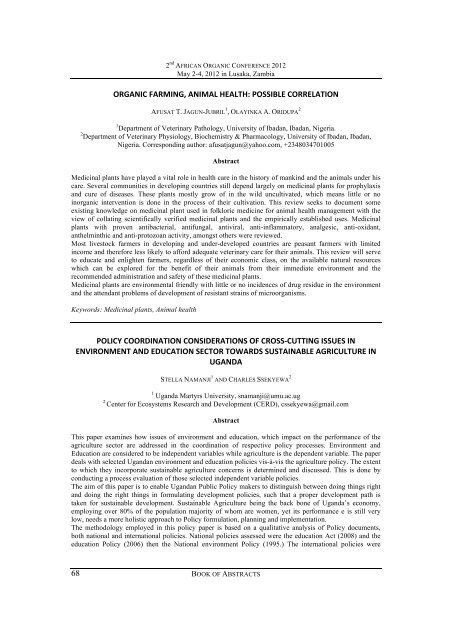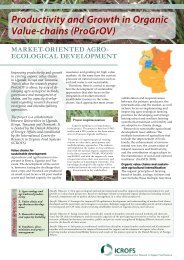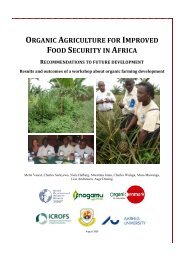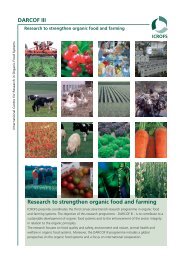The 2nd African Organic Conference â Mainstreaming ... - ICROFS
The 2nd African Organic Conference â Mainstreaming ... - ICROFS
The 2nd African Organic Conference â Mainstreaming ... - ICROFS
You also want an ePaper? Increase the reach of your titles
YUMPU automatically turns print PDFs into web optimized ePapers that Google loves.
2 nd AFRICAN ORGANIC CONFERENCE 2012<br />
May 2-4, 2012 in Lusaka, Zambia<br />
ORGANIC&FARMING,&ANIMAL&HEALTH:&POSSIBLE&CORRELATION&<br />
AFUSAT T. JAGUN-JUBRIL 1 , OLAYINKA A. ORIDUPA 2<br />
1 Department of Veterinary Pathology, University of Ibadan, Ibadan, Nigeria.<br />
2 Department of Veterinary Physiology, Biochemistry & Pharmacology, University of Ibadan, Ibadan,<br />
Nigeria. Corresponding author: afusatjagun@yahoo.com, +2348034701005<br />
Abstract<br />
Medicinal plants have played a vital role in health care in the history of mankind and the animals under his<br />
care. Several communities in developing countries still depend largely on medicinal plants for prophylaxis<br />
and cure of diseases. <strong>The</strong>se plants mostly grow of in the wild uncultivated, which means little or no<br />
inorganic intervention is done in the process of their cultivation. This review seeks to document some<br />
existing knowledge on medicinal plant used in folkloric medicine for animal health management with the<br />
view of collating scientifically verified medicinal plants and the empirically established uses. Medicinal<br />
plants with proven antibacterial, antifungal, antiviral, anti-inflammatory, analgesic, anti-oxidant,<br />
anthelminthic and anti-protozoan activity, amongst others were reviewed.<br />
Most livestock farmers in developing and under-developed countries are peasant farmers with limited<br />
income and therefore less likely to afford adequate veterinary care for their animals. This review will serve<br />
to educate and enlighten farmers, regardless of their economic class, on the available natural resources<br />
which can be explored for the benefit of their animals from their immediate environment and the<br />
recommended administration and safety of these medicinal plants.<br />
Medicinal plants are environmental friendly with little or no incidences of drug residue in the environment<br />
and the attendant problems of development of resistant strains of microorganisms.<br />
Keywords: Medicinal plants, Animal health<br />
POLICY&COORDINATION&CONSIDERATIONS&OF&CROSS:CUTTING&ISSUES&IN&<br />
ENVIRONMENT&AND&EDUCATION&SECTOR&TOWARDS&SUSTAINABLE&AGRICULTURE&IN&<br />
UGANDA&<br />
STELLA NAMANJI 1 AND CHARLES SSEKYEWA 2<br />
1 Uganda Martyrs University, snamanji@umu.ac.ug<br />
2<br />
Center for Ecosystems Research and Development (CERD), cssekyewa@gmail.com<br />
Abstract<br />
This paper examines how issues of environment and education, which impact on the performance of the<br />
agriculture sector are addressed in the coordination of respective policy processes. Environment and<br />
Education are considered to be independent variables while agriculture is the dependent variable. <strong>The</strong> paper<br />
deals with selected Ugandan environment and education policies vis-à-vis the agriculture policy. <strong>The</strong> extent<br />
to which they incorporate sustainable agriculture concerns is determined and discussed. This is done by<br />
conducting a process evaluation of those selected independent variable policies.<br />
<strong>The</strong> aim of this paper is to enable Ugandan Public Policy makers to distinguish between doing things right<br />
and doing the right things in formulating development policies, such that a proper development path is<br />
taken for sustainable development. Sustainable Agriculture being the back bone of Uganda’s economy,<br />
employing over 80% of the population majority of whom are women, yet its performance e is still very<br />
low, needs a more holistic approach to Policy formulation, planning and implementation.<br />
<strong>The</strong> methodology employed in this policy paper is based on a qualitative analysis of Policy documents,<br />
both national and international policies. National policies assessed were the education Act (2008) and the<br />
education Policy (2006) then the National environment Policy (1995.) <strong>The</strong> international policies were<br />
68<br />
BOOK OF ABSTRACTS





